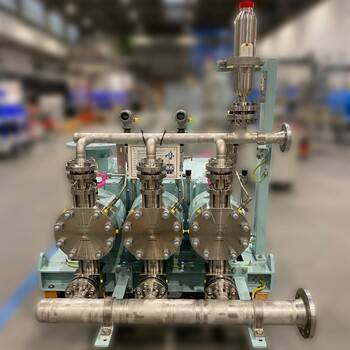Fuel gas supply systems
Reducing pollutant emissions in the shipping industry with LEWA's diaphragm pumps

The LEWA triplex process diaphragm pumps are designed in such a way that they can be maintained and repaired directly on board by the crew using simple means. Image Source: LEWA
In 2021, approximately 11 billion tons of freight were transported by sea globally, accounting for nearly 90% of all trade goods. The shipping industry produced over 1 million tons of greenhouse gases, contributing around 3% of global carbon dioxide emissions annually, along with other pollutants such as sulfur oxides, nitrogen oxides, volatile organic compounds, and ozone-depleting substances (ODS). In coastal Emission Control Areas (ECAs) defined by the MARPOL Convention, these pollutants face increasingly stringent limits. Ammonia (NH3) is emerging as a clean alternative fuel, as it does not emit CO2 during combustion. However, NH3 is toxic and environmentally harmful, necessitating hermetically tight technology for its use. LEWA's high-pressure diaphragm pumps meet these safety requirements, making them suitable for hazardous fluids like NH3.
In 2018, the shipping industry emitted 1,076 million tons of greenhouse gases, including 1,056 million tons of CO2, a 90% increase from 2008. Without change, emissions could rise by up to 130% of 2008 levels over the next 25 years. To address this, the International Maritime Organization (IMO) developed a strategy in 2018 to reduce the shipping industry's carbon dioxide emissions by 40% by 2030 and 70% by 2050. The Energy Efficiency Design Index for New Ships (EEDI) and the Ship Energy Efficiency Management Plan (SEEMP) regulate the energy efficiency and CO2 emissions of newly built ships, while older models must comply with the Energy Efficiency Design Index for Existing Ships (EEXI) from 2023.
Liquid Ammonia as a Sustainable Marine Fuel
Dual-fuel two-stroke marine diesel engines, which allow flexibility in fuel use, have been popular for several years. While LNG and LPG (propane/butane) have been used, they still release significant CO2 and methane, a potent greenhouse gas. Ammonia (NH3), first used as an alternative fuel in 1943, emits no particulate matter, nitrogen oxides, or CO2 during combustion and has no ozone depletion potential. Historically produced using the energy-intensive Haber-Bosch process, NH3 is now becoming attractive due to sustainable hydrogen production via electrolysis using renewable energies, addressing the well-to-wake (WTW) balance.
In late 2023, the first ammonia project for bulk carriers was launched, with CMB.TECH partnering with WinGD, CSSC Qingdao Beihai Shipbuilding (QBS), and CSSC Engine Co (CSE) to produce eight 210,000 DWT bulk carriers powered by NH3, to be delivered over the next three years.
Hermetically Tight Pump Technology in NH3 Dual-Fuel Drives
MAN Energy Solutions projects NH3 to constitute around 40% of the fuel mix for dual-fuel two-stroke engines by 2030. NH3 poses challenges as a fuel due to its toxicity and potential to form particulate matter when reacting with other pollutants. Safe and reliable NH3 movement within ships requires fail-safe, hermetically tight pump technology. Conventional plunger pumps, which leak at the plunger seal, are unsuitable. Only high-pressure diaphragm pumps designed without dynamic seals, such as LEWA's triplex diaphragm pumps, can ensure hermetically tight operations, preventing emissions.
LEWA Triplex Diaphragm Pumps for FGSS
LEWA's robust, low-pulsation triplex diaphragm pumps, proven in LPG applications, are ideal for NH3 with required pressures of approximately 85 bar. The M900 series pump heads, capable of up to 500 bar, handle particles or oil residues in the fuel without issues. Their dry-run safe design prevents costly failures, and onboard maintenance is simple. The patented sandwich diaphragm with integrated monitoring ensures no NH3 escapes even if the diaphragm is damaged. Overpressure protection and optional LEWA Smart Monitoring enhance safety. As NH3 becomes a key marine fuel, its corresponding drives could also contribute to the development of autonomous smart ships in the future.
For more information, please visit:
LEWA GmbH was founded as a family company by Herbert Ott and Rudolf Schestag in 1952. Today it is the world's leading manufacturer of metering pumps and process diaphragm pumps, as well as complete metering packages for process engineering. The company headquartered in Leonberg, Germany, developed into an international group in just a few decades. Since 2022, the company has been part of the Atlas Copco Group, a globally leading Swedish industrial corporation for compressed air and vacuum solutions, energy solutions, dewatering and industrial pumps, industrial power tools and assembly and machine vision solutions. Together with Atlas Copco Group, LEWA will further expand its industrial pump business. As a research and production-oriented company, LEWA develops technologies and solutions for the vast array of applications among its customers. The products are mainly used in the chemical, cosmetics, pharmaceutical and biotechnology industries, in the food and beverage segment and in energy utilities. They also play a role in the manufacture of plastics, detergents and cleaning agents. Other applications are in refineries and the petrochemical industry, the oil and gas industry, and the field of gas odorization. LEWA currently employs around 1,200 people and owns 14 subsidiaries around the world, as well as 80 representatives and sales offices in more than 80 countries.




